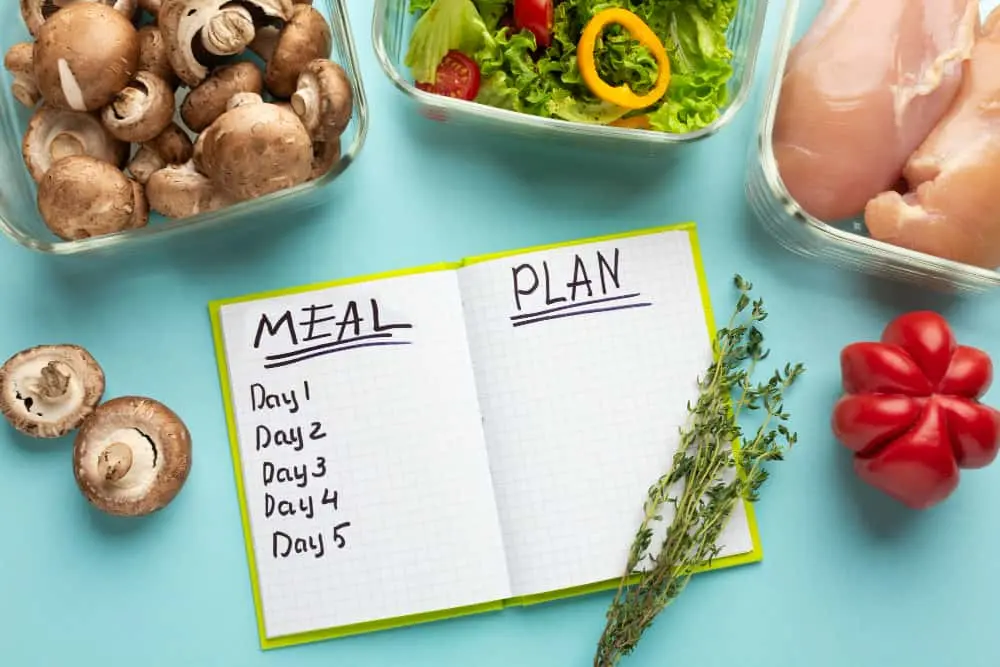Menopause Diet is a characteristic organic cycle that denotes the finish of a lady’s conceptive years. During this time, hormonal changes can lead to a range of symptoms, including hot flashes, mood swings, and weight gain.
While menopause is an ordinary piece of life, dealing with these symptoms can challenge. One way to support your physical and mental well-being during menopause is to follow a healthy diet.
In particular, a 5-day meal plan can be an excellent way to kick-start your weight loss journey and promote overall health. This meal plan should focus on whole, nutrient-dense foods, including fruits, vegetables, lean proteins, and healthy fats.
Incorporating regular physical activity into your daily routine can also be beneficial during menopause. It’s important to consult with a healthcare professional before making significant changes to your diet, especially during menopause.
In this article, we will provide a 5-day meal plan for menopause that emphasizes whole foods and healthy eating habits.
Also Read: Vegetarian Menopause Diet: A 5-Day Plan To Manage Weight And Hormones

5-day meal plan for menopause
Here is a 5-day meal plan for menopause:
Day 1:
- Breakfast: 2 hard-bubbled eggs with toast and avocado
- Lunch: Wild salmon burger with tomato and parsley
- Dinner: Grilled chicken with quinoa and steamed vegetables
Day 2:
- Breakfast: Greek yogurt with berries and nuts
- Lunch: Tuna salad with mixed greens
- Dinner: Baked cod with roasted sweet potatoes and asparagus
Day 3:
- Breakfast: Spinach and feta omelet
- Lunch: Chicken Caesar salad
- Supper: Turkey meatballs with zucchini noodles and marinara sauce
Day 4:
- Breakfast: Chia seed pudding with almond milk and sliced peaches
- Lunch: Quinoa and black bean salad
- Supper: Barbecued shrimp with earthy colored rice and sautéed spinach
Day 5:
- Breakfast: Smoothie with kale, banana, and protein powder
- Lunch: Egg salad with whole grain crackers
- Dinner: Baked chicken with wild rice and roasted vegetables
This meal plan emphasizes whole foods, lean proteins, healthy fats, and plenty of fruits and vegetables, which can be beneficial during Menopause Diet.
It’s important to stay hydrated and incorporate protein-rich foods into your diet during this period. Always consult with a healthcare professional before making significant changes to your diet, especially during menopause.
Also Read: The Menopause Diet A 5-Day Plan To Lose Weight
Menopause Diet: Finding the Right 5-Day Plan for You
It’s important to consult with a healthcare professional before starting any new diet plan, especially during menopause. However, the 5-day meal plans for Menopause Diet found in the search results can be a helpful starting point for those looking to incorporate healthy eating habits into their routine.
These meal plans emphasize whole, nutrient-dense foods, lean proteins, and healthy fats, which can be beneficial during menopause. It’s important to stay
hydrated and incorporate protein-rich foods into your diet during this period. Additionally, regular physical activity can also be beneficial during menopause.
It’s important to remember that everyone’s nutritional needs are different, and it’s essential to work with a healthcare professional to develop a personalized meal plan that meets your specific needs.
Understanding the Impact of Hormonal Changes and Metabolism
Menopause is a characteristic natural cycle that denotes the finish of a lady’s regenerative years. During this time, hormonal changes can lead to a range of symptoms, including hot flashes, mood swings, and weight gain.
Menopause has been identified as a high-risk stage for weight gain in a woman’s lifecycle, and menopause-related weight gain is a consequence of low circulating estrogen levels.
The decrease in estrogen and progesterone, along with aging in general, triggers metabolic changes in the body, including a decrease in muscle mass, resulting in fewer calories being burned.
If fewer calories are being burned, fat accumulates, and post-menopausal weight tends to settle around the stomach, which increases the risk of heart and breathing problems and type 2 diabetes.
However, there are ways to manage weight gain during menopause, including following a healthy diet and incorporating regular physical activity into your daily routine.
In this article, we will explore the science behind menopause and weight loss, including the impact of hormonal changes on metabolism and the efficacy of diet therapies in promoting weight loss in postmenopausal women. We will also provide practical tips for managing weight gain during menopause, including a 5-day meal plan for menopause that emphasizes whole, nutrient-dense foods, lean proteins, and healthy fats.
Also Read: Vegetarian Menopause Diet: A 5-Day Plan To Manage Weight And Hormones

Monitor Progress
Keeping track of and keeping an eye on your menopause signs can be very helpful for taking charge of the process.
Keeping track of your symptoms can help you get a baseline, find trends, and talk to your doctor about red flags. Keeping track of menopausal symptoms can be done in a number of ways, such as through apps, written notes, or urine tests.
Making changes to your lifestyle, getting care, or just feeling more in control during this time of change can all be helped by tracking.
This piece will talk about why it’s important to keep track of and watch menopause signs and give you tips on how to use apps and other tools to do that.
We will also talk about the benefits of keeping track of your menopause symptoms and how it can help you handle your trip through menopause.
The impact of menopause on bone health and osteoporosis risk
A big worry for women at this age is how menopause will affect their bone health and their risk of getting osteoporosis. When estrogen levels drop, bone loss happens more often than bone growth, which raises the risk of osteoporosis.
When talking about how menopause affects bone health and the chance of osteoporosis, here are some important things to keep in mind:
Estrogen plays a crucial role in bone health: Estrogen can help keep you from getting osteoporosis, and Menopause Hormone Therapy (MHT) has been shown to raise bone mineral density (BMD) by a large amount.
Menopause significantly speeds bone loss: Up to 20% of bone loss can happen during menopause, and about one in two women who have gone through menopause will have osteoporosis. Most of these women will break a bone at some point in their lives.
Vitamin D and calcium are essential for bone health: Calcium is important for making strong, healthy bones, and vitamin D helps the body absorb it. If a kid doesn’t get enough vitamin D and calcium, their bones might not form properly. As an adult, their bones can lose strength, become weak, and break easily.
Menopause transition is a critical period for bone health: As a woman moves into menopause, her bones lose strength quickly. In a 3-year window, bone strength changes significantly.
Medical treatments for osteoporosis are available: To treat osteoporosis, your doctor may suggest that you take certain drugs or get intravenous (IV) treatments and shots.
It’s important to eat a lot of calcium-rich foods, do weight-bearing movements, and think about Menopause Hormone Therapy (MHT) if you have a high risk for osteoporosis during menopause to keep your bones healthy. Regularly checking and keeping an eye on bone health can also help find problems early and make sure they are fixed in time.
Also Read: The Menopause Diet A 5-Day Plan To Lose Weight
Conclusion:
The shift to menopause is a unique time in a woman’s life that can cause changes in her weight and body shape. During this time, eating a healthy, well-balanced meal can be very helpful for weight loss and general health.
This article gives a 5-day meal plan that focuses on nutrition, staying hydrated, and weight loss to help women get through the menopause change.
During menopause, women can improve their health and well-being by eating whole foods that are high in nutrients, drinking enough water, balancing their macronutrients, thinking about intermittent fasting, and practicing thoughtful eating and self-care.
FAQS
What are the benefits of adopting a menopause diet plan?
A menopause diet plan that focuses on food, staying hydrated, and weight loss can help your health in general during this time. A good menopause diet plan includes eating whole foods that are high in nutrients, drinking enough water, keeping your macronutrients in balance, thinking about intermittent fasting, and using thoughtful eating and self-care methods.
How can I create a balanced 5-day meal plan for menopause?
For a healthy 5-day menopause meal plan, think about the following:
Limit processed foods, sugary sugars, and bad fats because they can make it harder to lose weight and hurt your health in general.
To make a custom plan, talk to a qualified dietitian or nutritionist who specializes in menopause.
Be steady with the changes you make to your food and lifestyle. Long-term habits are the best way to lose weight and improve your health.